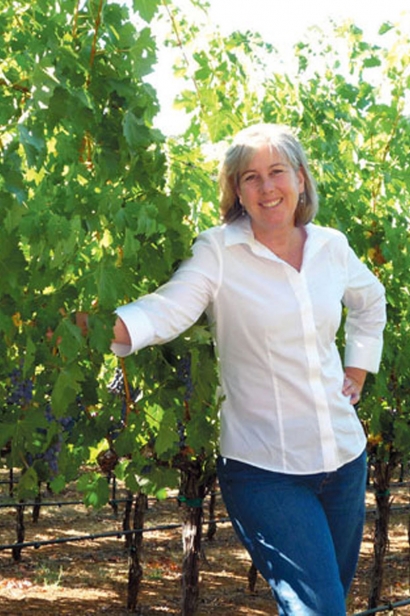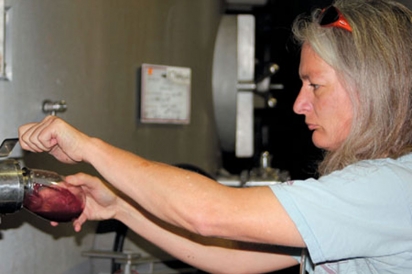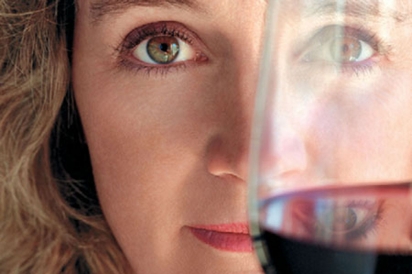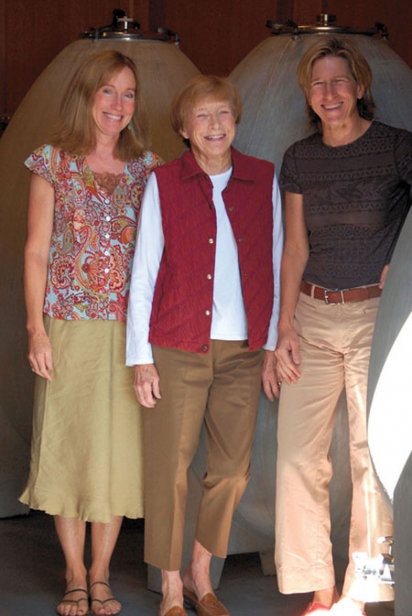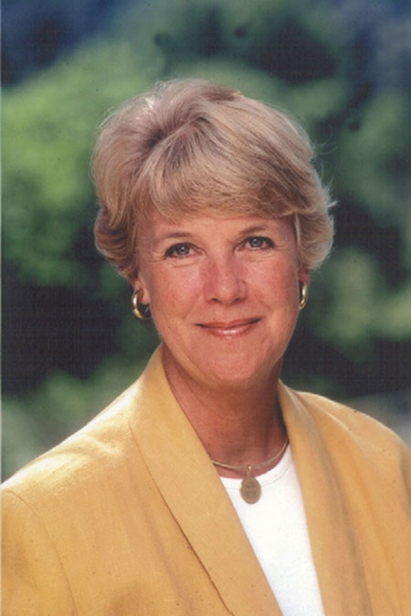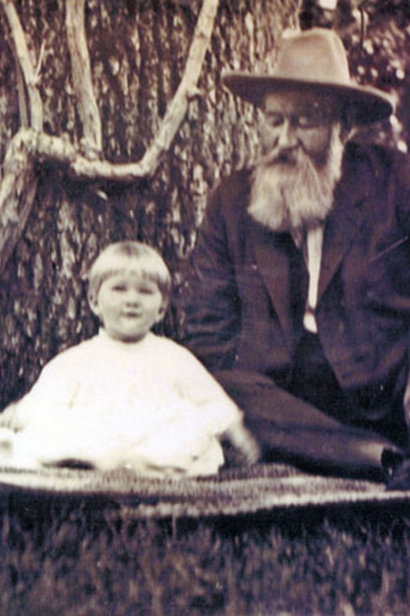Wonderful Women Winemakers
They have stood in wet vineyard fog, checking grapes at dawn. They know well the chill of a cellar and the heft of a barrel. They can recall times when people looked at them askance, shocked that the woman standing behind the tasting table was the person responsible for the extraordinary wine being poured.
What does it take to make great wine? Actually, let’s rephrase that. What does it take to rise to the top in the most prestigious wine region in the U.S., and to make some of the best wines in the world?
According to three of the most widely acclaimed female winemakers and two female presidents of highly regarded winery estates in the Napa Valley, the magic ingredients have nothing to do with gender. Instead, success is a balanced blend of the following: science, artistry and determined hard work.
CELIA WELCH, Winemaker and Founder of Corra Wines
Celia Welch knew from an early age that she was different. As she and her friends ran through the fruit orchards surrounding her Southern Oregon childhood home, she would stop to pick wild asparagus, savoring the taste. She remembers vividly the flavor of the green beans on her grandfather’s vines, and she taught herself to make cinnamon bread because she just couldn’t live without the smell of warm cinnamon in the kitchen. But it was not until she found her way to the UC Davis School of Enology and attended classes with others who were equally excited about every scent and flavor nuance that things began to make sense.
“I was in classes at UC Davis and everyone in the room was as passionate as I was!” Welch says. These fellow scientists and future winemakers were her people.
“This was the late ‘70’s, a time when the most famous winemakers were 70-year-old Italian men. There were a few women who were breaking the barrier, but at the time I had no idea what the path would look like.”
After the 1976 “Judgment of Paris” propelled California wines to international acclaim, the UC Davis program expanded and drew a number of women.
“Approximately one third of my class was women,” says Welch. “We weren’t the first out, but it was a very early time for women winemakers. We have stayed friends and colleagues and together we have put a stamp on California winemaking.” Welch worked her way up, slowly but surely, taking entry-level cellar and lab jobs in the U.S., New Zealand and Australia, doing anything and everything it took to learn more about making fine wine.
“There is a component of this job that is physical. It is not always comfortable. It’s not all candlelight and wine with dinner,” Welch says. She has done everything from pulling hoses to running equipment to, over the past two decades, making the final decisions for elite labels every step of the way.
As a consultant for ultra-premium wine estates, Welch earned a reputation as a maker of Cabernet Sauvignons that reflect the terroir of each wine.
“I am lucky now that most of my work is for clients who are looking for a ‘wow’ factor. They are ‘I want something extraordinary’ clients.” This is a far cry from the early days when Welch would tell tasters that she was the winemaker and eyebrows would go up because she was female. “It was,
‘Hey, Honey, look at this’–like my hair was green!” In 2004, Welch brought her talent to her own label, Corra Wines. The wines she makes there have furthered her reputation, consistently earning 90-plus ratings. “The ‘07 Corra was highly praised,” she says, “But it is the 2008 that I am very proud of. That was a particularly challenging vintage, and the challenging vintages are what separate the men from the boys.”
So to speak.
MIA KLEIN, Winemaker and Founder of Selene Wines
Slender and understated, Mia Klein has earned a powerful reputation in the Napa Valley. As a consulting winemaker for a red-carpet list of estate wineries, she has become known for her exacting palate and a clear-cut confidence to match.
“There are 32 shades of gray, so the decision is intuitive, “ says Klein of that moment when she determines that grapes are ready for harvest, or a wine is ready for bottling. “Tony Soter [Klein’s mentor for many years] used to say ‘Ask what the wine wants right now.’ The hardest thing is when the answer is nothing at all.”
A National Geographic survey has ranked women’s sense of smell above men’s and studies from Yale University and the University of Connecticut point to an abundance of female “Super Tasters.” But while the rest of the world wants to pinpoint a physical difference between men and women’s palates, Klein rejects the idea that making good wine has anything to do with gender.
“I’d hate to break it down to male and female,” she says.
“I might say masculine and feminine, and in any kind of creative job you need to be in touch with both. The best winemakers I know, male and female, have a balance of masculine and feminine qualities.”
Klein grew up in Hermosa Beach, California, closer to the rolling waves than the rolling vineyards, but when she took a job in wine retail in San Francisco she knew that she had found her passion, and made her way to UC Davis’ School of Enology. Klein’s no-nonsense demeanor and focus make it easy to see why she was hired immediately upon graduation. She quickly worked her way up from cellar jobs to assistant winemaker.
It was during these years, the 1990s, that she developed a long-term winemaking partnership with Soter, whom she credits for her hands-on sensibility. Klein worked as Soter’s assistant at Robert Pepi Winery for several vintages and then began to consult as winemaker for prestigious wineries such as Araujo, Viader and Dalla Valle. This may sound like a meteoric rise, and it was, but Klein’s description is characteristically pragmatic.
“My philosophy has been to work with very busy people and stuff spills off. A lot of responsibility came to me very quickly.”
In 2000, she started her own label, Selene Wines, and since then her Merlots, Cabernets and Sauvignon Blancs have earned a reputation of their own. In Klein’s opinion, starting Selene has only improved her ability to relate to other estate owners. She clearly thrives on the high stakes of the business of making wine.
“You are never fully ready. Do you every feel fully ready working with agriculture and natural systems? You better love it because you’d do just as well being a gambler. So many things are out of control. But that is what keeps everything fresh.”
HEIDI BARRETT, Winemaker and Founder of La Sirena Wines
The most remarkable universal quality of successful women winemakers is not that they are female. Their most distinct common characteristic is that they all seem to be doing exactly what they were destined to do. They are in that select group of people on the planet whose passion and abilities line up flawlessly with their vocation.
Winemaker Heidi Barrett exemplifies this phenomenon, which may explain her track record as a producer of flawless wines. Literally flawless, as her “cult Cabernets” have received four 100-point ratings from Robert Parker.
“My mother was an artist and my father was a winemaker at BV. I was good at science and math, and my mom always had us making art. So I am genetically bred for this, in a way,” Barrett says. The tall, elegant Barrett describes winemaking as a combination of agriculture, science, design and marketing, a profession that fully engages both the left and right brain.
Barrett’s father, renowned winemaker Richard Peterson, first worked for Gallo in Modesto, and it was then that the young Barrett first began tasting wine at the dinner table. She was 2!
“We would taste the wines and they would ask our opinions,” she says, as if this were a run-of-the mill tradition. Her family eventually moved to the Napa Valley and she grew up having summer jobs in wineries and vineyards. At the end of high school, her father moved the family to Monterrey.
“It was there that I fell in love with some of the other cooler climate wines and decided to go work in Germany.” Barrett found an internship with a large co-op in Southern Germany. “In Germany a light bulb went off. There I learned about balancing wines, that you could make wines that are elegant and balanced, and you could do it with any color grapes.” Blending, a final critical step in the winemaking process, is Barrett’s specialty, and many feel she has unparalleled talent.
Barrett earned her degree from UC Davis and went on to cellar and lab jobs at Franciscan, Silver Oak and Rutherford Hill. She also worked for Lindeman Wines in Australia, where she says she learned “versatility, to think on my feet and work with what I’ve got.”
She eventually became the assistant winemaker at Bouchaine Vineyards and, soon after, at the young age of 25, she became the winemaker for Buehler Vineyards where she quickly garnered attention. By the late ‘90s she had become an independent winemaker for Dalla Valle, Grace Family, Screaming Eagle, Paradigm and many others. She earned an astounding 100 points from Parker for her Dalla Valle ‘92 and ‘93 “Maya” Cabernets, as well as her Screaming Eagle ‘92 and ‘97 vintages.
In 1994, Barrett started her own label, La Sirena, making Cabernet Sauvignon, Syrah, proprietary blends and a Muscat Canelli. Her wines have been described as both strong and elegant, which would be an apt description for Barrett herself.
“I’m 5-feet-9, a healthy strong woman,” Barrett says, smiling when asked if she has ever felt self-conscious about being the only woman in sight. “In Australia it was 25 guys and me. They would hand me the shovel. We’d work all day and then go out and have beers.”
BETH NOVAK MILLIKEN, President, Spottswoode Wine Estate
The Spottswoode Wine Estate business offices have a certain feminine appeal. The rooms of the remodeled Victorian are bright and open, painted a cheerful yellow, with light streaming through the large windows. And women are everywhere–behind desks, in the tasting room and meeting around a circular table on the wide wooden front porch
Beth Novak Milliken is the youngest of the Novak women involved in this family wine business, and its president. Spottswoode is known for its female leadership as well as its four highly praised wines–Spottswoode Sauvignon Blanc, Lyndenwood Cabernet Sauvignon, a Rhone-style wine called Field Book, and the renowned Spottswoode Estate Cabernet.
“In 1972, we came up from Southern California on a family trip and my parents fell in love with this area,” Milliken says. “They wanted to raise us in a more agrarian setting. They were lifestyle connoisseurs more than wine connoisseurs, and purchased this property just by accident.”
As it turned out, the historic Victorian home with 40 acres of vines happened to be on prime grape-growing soil. Over the next five years, Milliken’s father, Jack Novak, a young emergency room doctor, spent as much time as possible on the tractor, replanting the pre-Prohibition vineyards.
“In ‘77, at the age of 44, my father died of a heart attack,” Milliken says. It was then that her mother, Mary Novak, a widow with five children, needed to make a major decision about the estate.
“Mom decided to keep it,” Milliken says of Mary Novak, who is now almost 80 and is regarded as the matriarch of the Spottswoode estate. Already, the land had proven its capacity to produce excellent fruit, and Mary Novak found ready buyers for her grapes.
It was not until 1982 that the Spottswoode label produced its first vintage of Cabernet Sauvignon. Not long after, in 1985, at the urging of winemaker Tony Soter, the family embraced organic farming practices.
“My mother was born in 1932,” says Milliken. “For her to say yes and farm organically, it must have been like voodoo to her back then.”
The Spottswoode organic tradition and habitat restoration projects are of particular importance to Milliken, who is personally passionate about environmental protection.
Milliken now works with her sister, Lindy Novak, who is the director of marketing for Spottswoode, and an impressive list of winemakers including Rosemary Cakewood. Aron Weinkauf, a young man Milliken describes as “incredible,” is Spottswoode’s current winemaker. While the Spottswoode employees are by no means exclusively female, says Milliken, the winemaking process is absolutely collaborative.
“We are a family business, a team, and that is just the way we work.”
ROBIN LAIL, Founder and President, Lail Vineyards
For many years, Robin Lail lived far away from her idyllic childhood home in the Napa Valley, far away from the legacy of her great-grandfather, Gustav Niebaum, who founded Inglenook Winery in 1879. Her father, John Daniel Jr., ran Inglenook until 1964, when, tragically, he was forced to sell the family home and the estate was divided. Heartbroken by the loss, Robin Lail pursued a career in international banking in San Francisco, married and started her family. But over time she found herself drawn back to the land and the practices of her heritage.
“You cannot ignore your pulse,” she says, of her decision to move back to the valley and rebuild her life around winemaking. She initially worked as the assistant to her father’s friend, Robert Mondavi, at Mondavi’s Oakville winery, before founding Dominus Estate with her sister, Marcia Smith, and the French winemaker Christian Moueix, and then cofounded and served as president of Merryvale Vineyards for 10 years.
Then, in 1995, Robin and her husband, John Lail, established their own family winery, Lail Vineyards, producing highly lauded Cabernets and Sauvignon Blancs.
“I am very proud of starting my own vineyards,” she says. “It was scary, like having a pair of wings attached to your back and standing on the cliff with rocks below. Initially, there was a lot of wing flapping. But I had finally fully embraced something that was so important to me.”
Lail’s love of the Napa Valley and her community is palpable. “The Napa Valley is an incredible location on this planet,” she says. “There is a sense of buoyancy here, a sense that the rising tide floats all boats.” She speaks with a reverence for her own family–her husband, John, and daughters Erin and Shannon, who are business partners–and also for the people in the extended Napa Valley community.
Despite impressive accolades for the wines she has touched along the way, Robin Lail’s proudest moment is of a different ilk.
“I am especially proud to have built the first auction in the Napa Valley. We built something out of nothing,” she says. Lail seems to have inherited her great-grandfather Niebaum’s talent for starting from the ground up: Since its inception in 1981, the now-world-famous Auction Napa Valley has provided over $100 million to youth, health care and affordable housing programs.
While each of these women acknowledges that she has often been the only woman in the cellar or at the board table, not one of these superstars identifies herself as a “woman winemaker.” They are winemakers and estate presidents who happen to be female. And they all humbly downplay the extent to which they have had to ignore doubters, stay the course and trust their own abilities in order to rise to the top of a traditionally male-dominated profession.


